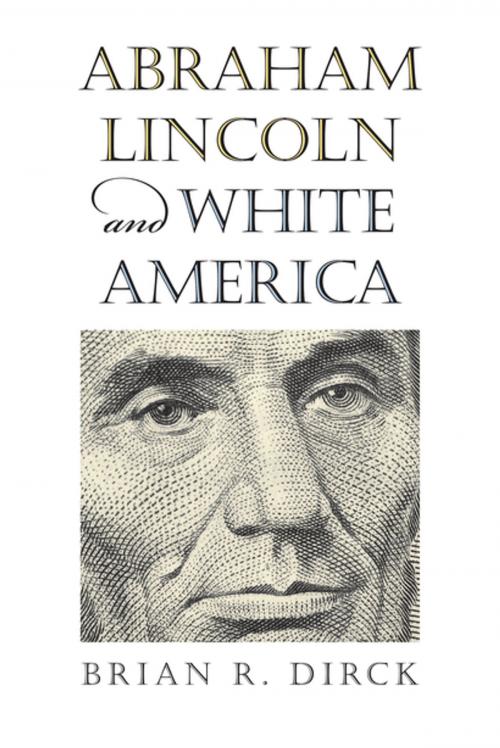Abraham Lincoln and White America
Nonfiction, History, Americas, United States, 19th Century, Biography & Memoir, Political| Author: | Brian R. Dirck | ISBN: | 9780700621828 |
| Publisher: | University Press of Kansas | Publication: | July 19, 2015 |
| Imprint: | University Press of Kansas | Language: | English |
| Author: | Brian R. Dirck |
| ISBN: | 9780700621828 |
| Publisher: | University Press of Kansas |
| Publication: | July 19, 2015 |
| Imprint: | University Press of Kansas |
| Language: | English |
As "Savior of the Union" and the "Great Emancipator," Abraham Lincoln has been lauded for his courage, wisdom, and moral fiber. Yet Frederick Douglass's assertion that Lincoln was the "white man's president" has been used by some detractors as proof of his fundamentally racist character. Viewed objectively, Lincoln was a white man's president by virtue of his own whiteness and that of the culture that produced him. Until now, however, historians have rarely explored just what this means for our understanding of the man and his actions.
Writing at the vanguard of "whiteness studies," Brian Dirck considers Lincoln as a typical American white man of his time who bore the multiple assumptions, prejudices, and limitations of his own racial identity. He shows us a Lincoln less willing or able to transcend those limitations than his more heroic persona might suggest but also contends that Lincoln's understanding and approach to racial bigotry was more enlightened than those of most of his white contemporaries.
Blazing a new trail in Lincoln studies, Dirck reveals that Lincoln was well aware of and sympathetic to white fears, especially that of descending into "white trash," a notion that gnawed at a man eager to distance himself from his own coarse origins. But he also shows that after Lincoln crossed the Rubicon of black emancipation, he continued to grow beyond such cultural constraints, as seen in his seven recorded encounters with nonwhites.
Dirck probes more deeply into what "white" meant in Lincoln's time and what it meant to Lincoln himself, and from this perspective he proposes a new understanding of how Lincoln viewed whiteness as a distinct racial category that influenced his policies. As Dirck ably demonstrates, Lincoln rose far enough above the confines of his culture to accomplish deeds still worthy of our admiration, and he calls for a more critically informed admiration of Lincoln that allows us to celebrate his considerable accomplishments while simultaneously recognizing his limitations.
When Douglass observed that Lincoln was the white man's president, he may not have intended it as a serious analytical category. But, as Dirck shows, perhaps we should do so—the better to understand not just the Lincoln presidency, but the man himself.
As "Savior of the Union" and the "Great Emancipator," Abraham Lincoln has been lauded for his courage, wisdom, and moral fiber. Yet Frederick Douglass's assertion that Lincoln was the "white man's president" has been used by some detractors as proof of his fundamentally racist character. Viewed objectively, Lincoln was a white man's president by virtue of his own whiteness and that of the culture that produced him. Until now, however, historians have rarely explored just what this means for our understanding of the man and his actions.
Writing at the vanguard of "whiteness studies," Brian Dirck considers Lincoln as a typical American white man of his time who bore the multiple assumptions, prejudices, and limitations of his own racial identity. He shows us a Lincoln less willing or able to transcend those limitations than his more heroic persona might suggest but also contends that Lincoln's understanding and approach to racial bigotry was more enlightened than those of most of his white contemporaries.
Blazing a new trail in Lincoln studies, Dirck reveals that Lincoln was well aware of and sympathetic to white fears, especially that of descending into "white trash," a notion that gnawed at a man eager to distance himself from his own coarse origins. But he also shows that after Lincoln crossed the Rubicon of black emancipation, he continued to grow beyond such cultural constraints, as seen in his seven recorded encounters with nonwhites.
Dirck probes more deeply into what "white" meant in Lincoln's time and what it meant to Lincoln himself, and from this perspective he proposes a new understanding of how Lincoln viewed whiteness as a distinct racial category that influenced his policies. As Dirck ably demonstrates, Lincoln rose far enough above the confines of his culture to accomplish deeds still worthy of our admiration, and he calls for a more critically informed admiration of Lincoln that allows us to celebrate his considerable accomplishments while simultaneously recognizing his limitations.
When Douglass observed that Lincoln was the white man's president, he may not have intended it as a serious analytical category. But, as Dirck shows, perhaps we should do so—the better to understand not just the Lincoln presidency, but the man himself.















